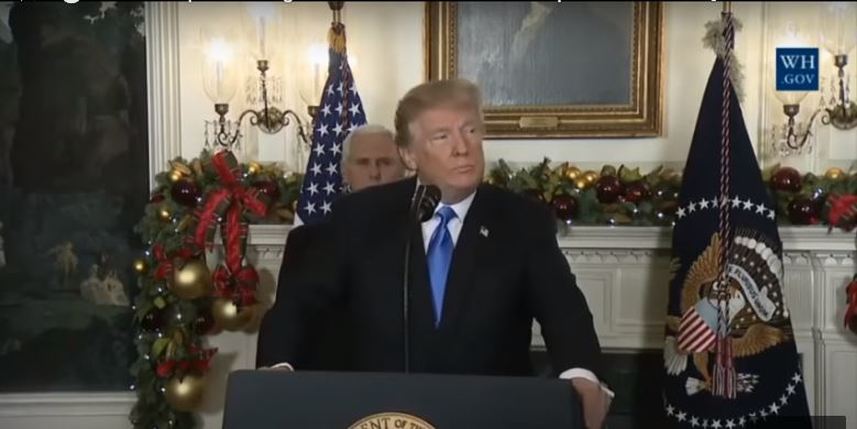Israel has launched a campaign to encourage nations to follow the US lead by recognizing Jerusalem as capital of the Jewish state and moving their embassies there.
By: Steve Leibowitz, World Israel News
While many nations condemned US President Donald Trump’s announcement recognizing Jerusalem as Israel’s capital, others are already following America’s lead and exploring the idea of beginning the process of moving their embassies.
Within hours of Trump’s landmark address, the Czech Republic and the Philippines were reportedly in contact with Israel’s foreign ministry to discuss the issue.
According to Israel Radio, the Czech Republic said Wednesday night that it “recognizes Jerusalem to be in fact the capital of Israel in the borders of the demarcation line from 1967.” The Czech Republic, together with other EU member states, following the EU Foreign Affairs Council conclusions, considers Jerusalem to be the future capital of both states, meaning the State of Israel and a future “State of Palestine.” Israel Radio also reported that Philippines President Rodrigo Duterte sent an official message to Jerusalem declaring that he wants to move his nation’s embassy.
Speaking off the record, a leading Israeli expert in international affairs told World Israel News (WIN), “I do not expect an avalanche of countries rushing to Jerusalem. But there are some nations, like the Czech Republic and the Philippines, that want to find favor either with Israel or the United States, each for its own reason. The Czechs are kind of mavericks and feel close to Israel. The Philippines president is considered something of an international outlaw at present, widely criticized for mass extrajudicial killings, but he recently had a positive meeting with Trump and plans to visit Israel in May.”
Netanyahu optimistic about the future
The unnamed expert cited Macedonia, Hungary and Lithuania as very pro-Israel nations that may soon have an inkling to move their nations’ embassies.
Prime Minister Benjamin Netanyahu is reportedly hopeful that several mostly Christian countries in Africa could be swayed to move their embassies. A warming in ties with the continent has been reported following the Prime Minister’s recent visit to Kenya.
Netanyahu announced that Israel is already in contact with other friendly nations in an effort to get them to follow Trump’s lead. Speaking at the Foreign Ministry on Thursday, he said, “I would like to announce that we are already in contact with other countries which will issue a similar recognition.” Furthermore, “I have no doubt that the moment the American Embassy moves to Jerusalem, and even before then, there will be a movement of many embassies to Jerusalem. The time has come.” Netanyahu declined to name any of the countries with which the Foreign Ministry has been in touch.
Netanyahu, commenting on Trump’s speech, did not hold back on the hyperbole, saying, “President Trump has immortalized himself in the chronicles of our capital. His name will now be held aloft, alongside other names connected to the glorious history of Jerusalem and of our people.”
Most world leaders opposed to Trump’s message
Most world leaders speaking out on the issue were very much opposed to Trump’s message. France, Britain, Germany, Italy and Sweden were but a few of the leading nations issuing statements making it clear that they have no plans to move their embassies to Jerusalem. Most added comments advocating calm and a commitment to a negotiated settlement and a two-state solution.
Alan Baker, an International Law expert at the Jerusalem Center for Public Affairs, told WIN, “Once the dust settles there will be movement toward Jerusalem. Currently there is a huge panic because of the dire comments by the French, British, Turks, Jordanians and Palestinians. When things settle down, I think the Australians will come along and I would hope that other friendly states will do so as well.”
Baker, a former Israeli ambassador to Canada, added, “I would expect Canada to move and it’s appropriate, but the present Canadian government has taken a step back from the former, more supportive government.”
Curiously silent on the issue in recent days is Russia. Last April, in a surprise move, Moscow announced that it considers western Jerusalem to be Israel’s capital. The Kremlin had issued a statement, reading, “We reaffirm our commitment to the UN-approved principles for a Palestinian-Israeli settlement, which include the status of East Jerusalem as the capital of the future Palestinian state. At the same time, we must state that in this context we view West Jerusalem as the capital of Israel.”
Israel’s position: Jerusalem is the united capital
In May, Israelis and Jews around the world celebrated 50 years since the reunification of Jerusalem during the Six Day War. The official position of the Israeli government is that Jerusalem must remain the undivided capital of the Jewish state. Ahead of Trump’s speech, the leading opposition parties supported that position. Speaking Wednesday at the Jerusalem Post‘s Diplomatic Conference, Yesh Atid party leader Yair Lapid expressed hope that the president would recognize a “united Jerusalem.” Avi Gabby, head of the Zionist Union alliance, told Israel Radio, “Jerusalem will remain undivided under Israeli sovereignty in any future peace agreement.”


